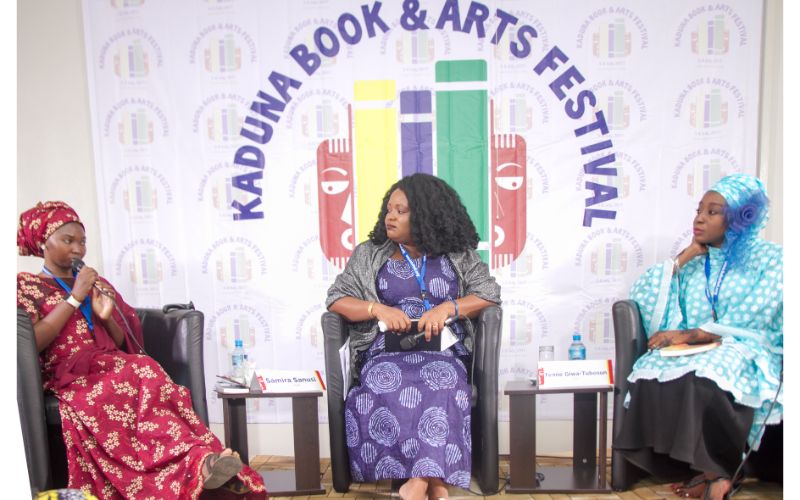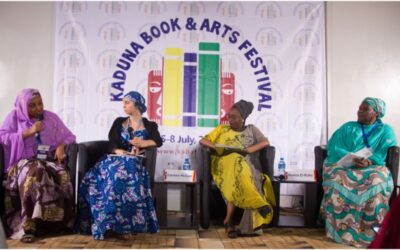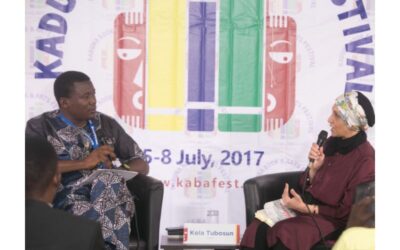Women Overcoming Barriers
The moderator of the panel, Temie Giwa-Tubosun, had had over ten years of experience in global health, and is CEO of LifeBank; a company using modern means to solve blood shortage in Nigeria. Giwa-Tubosun, after introducing the writers, and delving into women’s writing and the challenges faced in putting books together asked the writers for the motivation behind their pens. Samira Haruna Sanusi whose memoir S Is For Survival raises awareness as well as educates on sickle cell, noted that she came to writing after spending seven (7) years of her life in hospitals, 6 years in a wheelchair and surviving 28 surgeries. Having spent more time in the hospital instead of a classroom like her fellow writer Maryam Awaisu, she finally drew strength from her experiences and gave voice to her stories. She confessed having more books than toys and have written her book to survive, and to see its effect on people with similar cases.
‘How did writing help your condition?’ asked the moderator. Maryam Awaisu whose fictionalized memoir was shortlisted for the NLNG Prize in 2016; discussed missing opportunities that have been denied her by the aforementioned sickness. The weight of expectations from society and the question of her survival had not only been a code of existence in real life but in her fiction as well. She narrated how her continuous health crisis shook her faith. The physical suffering and psychological ripples that had her family rallying around her left her with a tinge of guilty. To have shut down everyone’s else’s life for her survival is a sacrifice which like the sickness has no price-tag.
The intensity of the subject matter gradually gravitated away from the books to the personal. Samira recalled how her bone transfer almost failed and how she had to be brave to survive alone in a hospital in Israel. Her narrative explored instances where her father moved mountains for her and his unflagging commitment to the course of her survival. It is this faith and conviction that he had on her survival that made her to sometimes question her own capacity to do the same for someone. Or for him. When asked by Giwa-Tubosun if she did get angry, she narrated how she went to her hometown, Funtua, and was wrongly diagnosed, setting up another crisis. After sharing her years of being bedridden instead of being in school and the lies doctors maintained about her health; and the burning rage within, she was able to triumph over it all to make something beautiful and magical.
Maryam disclosed to the audience what she has chosen to fictionalize her memoir. being young and only 22 years of age at the time, she felt too young to write a memoir as though she had truck-loads of experience and had decided to blend her facts with fiction to make it interesting. ‘Your first book, whether you realize it or not, is autobiographical’ she said. Though Maryam wanted Burning Bright to be entertaining, she is convinced that at the end, readers would learn about sickle cell and create awareness.
In reacting to the question of being called a ‘sickler’, Samira said she would prefer to be called a warrior because every day of her existence is a fight against a sickness trying to consume her. Her existence and everything she did or doing right now is an engagement in the battlefield of survival because she had fought battle that people half her age had no idea of. Contrary to her view, Maryam personally had no axe to grind with labels. For her, being called a ‘sickler’ indirectly was an awareness campaign in itself. ‘I’m not going to be pissed,’ she said, ‘its what it looks like.’
The dating question was very sensitive. The moderator, Giwa-Tubosun, roused the question of genotype and asked if love really ‘conquers’ all? Though there were mixed reactions at first, Samira was quick to affirm that when it came to medical issues, love couldn’t conquer all. ‘Sickle cell isn’t a storm,’ she said, ‘its a hurricane.’ She lamented the cruelty of knowing parents who deliberately brought children to the world and into such kind of trauma. Citing herself as example, the sickness literary erased her childhood. She confessed to gradually building up happy memories in her adulthood, and advised the audience to look beyond life, genotype and good health other than mere passion or material possession.
From blood-matching samples, chemotherapy, to genetic engineering, the two writers enlightened all about the dangers and unfathomable implications of living with the sicknes, especially those who couldn’t afford daily treatments, let lone, bone-marrow transplant which at the moment is costing about 140, 000 Euros. The economic, physical and psychological scope of the disease according to its survivors had to be handled with government support, individual sacrifices, campaigns and support in the manner that HIV and AIDS was tackled. Maryam, particularly, called on government to declare a state of emergency to arrest – through researches, the snowballing situation from becoming a permanent nuisance to the well-being of all, because countries with the cure have less patients than Nigerians. It was concluded that every effort geared towards the general well-being of citizens that couldn’t be felt at the grassroots levels have failed.
Written By Dominic Aboi


